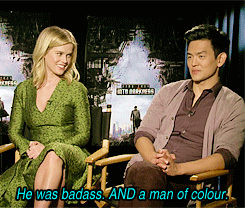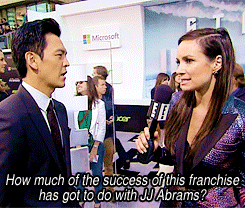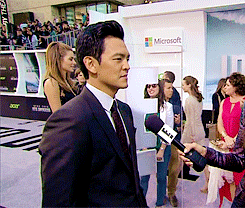rainbowrowell: crossedwires: niqaeli: I admit, I don’t know…




I admit, I don’t know Cho that well, so I am glad there are other readings to be had!And if he is just calling it out simply because he’s tired of it and he feels comfortable doing so even on his own films now, I think that’s fantastic. There’s certainly plenty for him to be calling out.
Heh. Well, I don’t know John Cho either. But he has talked about race & representation before* (and not in a ‘we’re all human, it doesn’t matter’ way), so it’s not completely ‘out of character’ for him to bring it up. I think it probably would be easier on him if he didn’t say anything, but I’m glad he does.
*Re Harold & Kumar (https://www.youtube.com/watch?v=NHEkLBZI1IM 4:07 mark): If you have a Korean and an Indian guy as your leads, you must address race at some point in the movie. You must, because the audience is noting it, really. The other thing is, I think, comedy at its best, treads in taboo waters a little bit. It has to have that transgressive quality to it, and race is the biggest taboo in America. I mean, people are very reluctant to talk about race and yet when you do jokes about race, uh, that work, people are very happy to release tension and laugh about it. But it has been interesting. I’ll make an observation. During the first tour for the first movie, we were talking about race all the time with journalists. It was almost like a process— looking back, the first movie was more concerned with race, but we talked about it so much, I felt that it was in a way…a way of justifying our presence in a motion picture.
And from an interview in 2009 http://www.asiaarts.ucla.edu/090703/article.asp?parentID=110145>:
JC: I recall from the Harold and Kumar movies is my struggle with the advertisers.
APA: What happened there?
JC: There was all this racial humor in the movie, and the advertising department wanted to say “Starring the Asian guy in American Pie, and the Indian guy from Van Wilder…” and they did go with that, and they submitted that to me for approval, and I said, “I don’t like it.” They asked me why, and I explain it to them, and that was tricky because it’s difficult explaining to my own representatives, why that didn’t jibe with me, because everyone kind of felt like it was keeping in tone with the movie. And I said, “I don’t like it. We’re poking fun at racism in the movie all the time, but it puts the audience on the wrong side of the racism joke.” So they were playing with the wording a little bit in the edits, and they kept coming up with versions to make me happy, but they were essentially the same thing, and I finally said, “you are not going to make me happy. You’re dancing around it, and you’re clearly attached to this idea, and I want you to know that no version of this idea will make me happy. And if you’re afraid that I won’t show up to do promotion because of this bitterness, you can rest assured that that’s not true. I consider promoting a movie part of my duties, and I will show up nevertheless. But you can either use this campaign and know that I’m unhappy, or you can change it and know that I’m happy. That’s it. Stop trying.” And eventually they went with it, and it’s one of those things where I look back and I’ve very proud of the movie, but that’s the thing I remember.
APA: Last question…for Harold and Kumar Escape From Guantanamo Bay, Viva La Union recorded a song for the soundtrack with the line, “I want my own Chinese baby” — what’s that about?
JC: When I was thinking about it, I thought of a literal baby. There’s a kind of lack that children fill, that’s just the dark side of being a parent, I think. And there’s an accessory quality to Chinese babies in America, and I just think it’s funny. I just liked it. And you know, I would know people who would fawn over Asian babies more, and it got me to thinking, there’s this belief that Asian babies are really cute, and it got me thinking that our whole race is infantilized to some degree, and it manifests itself in different ways. You infantilize a woman, and she becomes eroticized. You infantilize a man, and he becomes emasculated. You infantilize a baby [laughs] — and it’s possible, it appears that you can infantilize a baby even more. [laughs] The babies need to be cuter than white babies. And it’s just a weird thing that I felt like said something about mainstream America’s relationship to Asians in general. So that’s where it came from.
Also this interview: http://blog.angryasianman.com/2008/04/q-with-john-cho.html
“And yes, I do feel a responsibility, and always have, and it’s been an odd burden for me. Even when I started and no one gave a shit, I was trying to avoid doing roles—and it’s no accident that I’ve never done something with a chop suey accent. It’s no accident that I’ve never played those parts. I strongly believe there are a lot of Asian American actors who think that that’s the price to pay before you get to wherever you’re going. And I take real issue with that. Because you have to maintain integrity from the start, and on a personal level, you have to not do something that’s going to make you sick to your stomach.
But on a political level, how are things supposed to ever change if there’s someone willing to do it? I can tell you now, having worked in the business, that you can gather an army of people to hold picket signs and stand outside the studio, and say, “we destest this portrayal”… but it doesn’t matter if there’s a guy—who they know, a peer—who’s willing to do it, who stands in front of the crew and does the buck-tooth accent. If he or she is willing to do it, it makes the protestors look like extremists. It makes this guy look like the normal guy. Because we all work in the same industry. So the willingness of one actor negates a thousand protestors and a thousand angry letters.”
(So I can see why Butawhiteman Cantbekhan playing Khan would be deeply upsetting to him, even if Cho wasn’t in this movie.)
What I love about all these John Cho quotes is how thoughtful he is. Like he knows how complicated these issues are, but he’s still committed to doing the right thing. I especially like what he said about putting the audience on the wrong side of the joke.
Reposted from http://lies.tumblr.com/post/51308686692.
